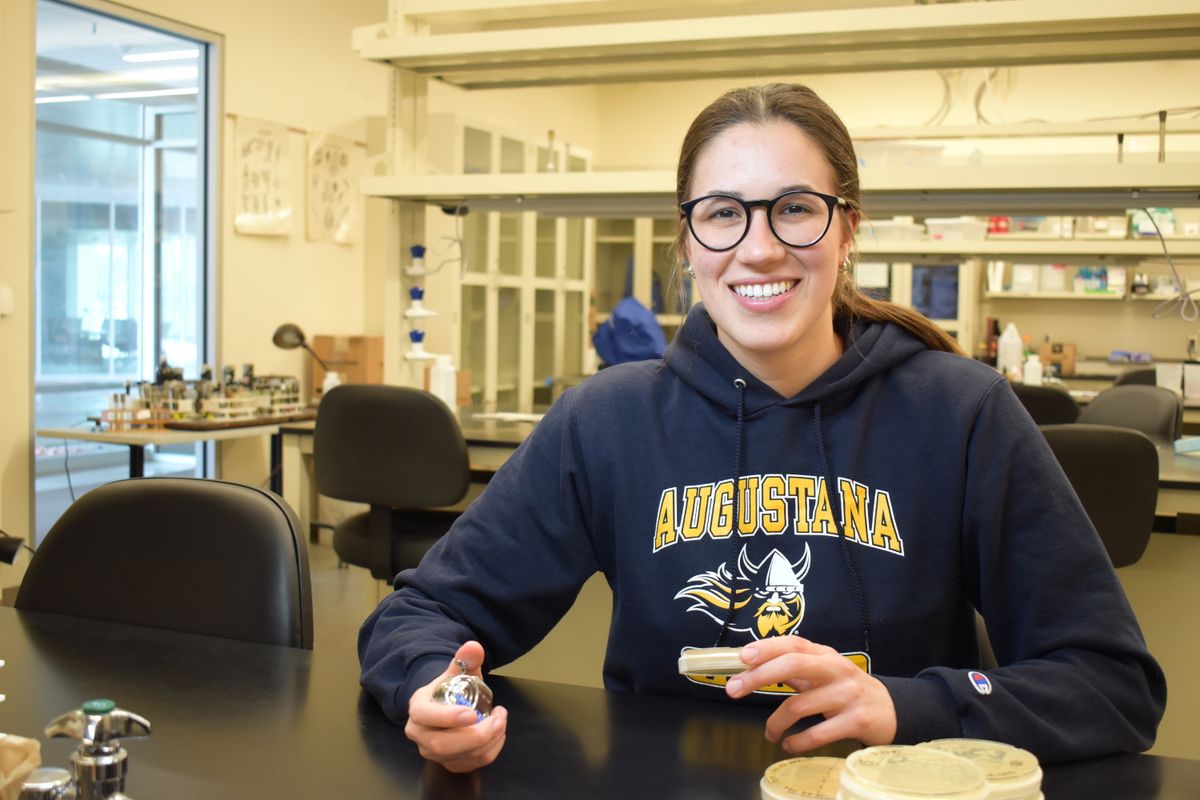Students advocate for sustainability at research symposium

Nobody planned for sustainability to become a theme surrounding the Arthur Olsen Student Research Symposium this year.
It was the biology department’s turn to coordinate a keynote speaker. In October 2022, the symposium committee signed off on Esther Ngumbi, assistant professor of entomology and African American studies at the University of Illinois Urbana-Champaign. Her work focuses on global change and sustainability.
“Once we choose the keynote speaker, that in some ways informs the rest of the symposium in particular, directing us maybe towards a theme, even if it’s not official,” Daniel Perry, a mathematics professor and the symposium chair, said.
Student submissions started rolling in this spring. A handful of them focused on sustainability, particularly within agriculture, just like Ngumbi’s work.
Sophomore Lara Matuck, a biology major, was looking for a way to get involved with research over the summer. With no plans to go to medical school, she was hoping to find something that would engage her degree without having a medicinal focus.
That’s when she heard of the research that biology professor Jenny Gubbels was doing in Canton over the summer.
“I didn’t know what I could do, and I feel like this experience showed me that there’s many things I could do with my degree, or I could go to graduate school,” Matuck said. “I never thought about that before.”
Matuck, Gubbels and biology professor Paul Egland wanted to research the effects of biochar on eggplant growth.
Biochar is biomass that’s burned at high temperatures with very low oxygen, which results in a porous, charcoal-like substance, Matuck said. The group tested whether biochar would increase the weight of the eggplants grown, affect the number of vegetables produced or improve the overall appearance of the plant.
After the summer was over, Matuck put the research into a poster that now hangs in the Froiland. She’ll present that poster at the symposium on April 15.
“I think it’s pretty cool to be a part of a group of people that are doing research and doing science,” Matuck said.
Senior Ana McCabe also chose an agricultural sustainability topic, but she did the research alone as part of her thesis for her environmental studies major.
McCabe’s thesis focuses on finding the most sustainable food sourcing option while considering a variety of household variables, such as food deserts, budgets and access to sustainability.
“Food sustainability is such a huge subject that it was hard to narrow it down,” McCabe said. “I thought of the difficulties of being sustainable but also realizing that there are so many other households in one community that my sustainability for food might be different than someone else’s.”
This will be McCabe’s second time presenting at the symposium, but this year she’s doing an oral presentation instead of a poster.
“It just gives you great life skills to use once you have a career, like just being able to present to people that you might not know or learning how to present to the public on issues that you know a lot about, but they might not,” McCabe said.
In addition to the poster presentations and the oral presentations, Perry said there will be a table display sharing the work from biology professor Sally Mallowa’s interim class on global food sustainability. While these aren’t formal submissions to the symposium, Perry said it shows how the campus gets excited about student research.
Despite the large amount of sustainability research at this year’s symposium, students will present on plenty of other topics, like languages and STEM research. There will even be students presenting history talks from history professor Cory Conover’s class.
“Sometimes research can have a very isolating effect, and maybe this is a benefit of the symposium for both the speaker and the audience,” Perry said. “It’s a way of breaking down the isolating factor that comes from research and making it more of a communal moment.”



